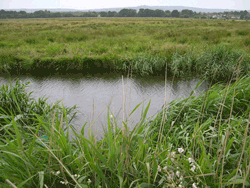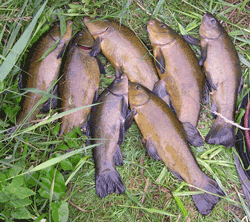| MARK WINTLE |
| Mark Wintle, an angler for thirty-five years, is on a quest to discover and bring to you the magic of fishing. Previously heavily involved with match fishing he now fishes for the sheer fun of it. With an open and enquiring mind, each week Mark will bring to you articles on fishing different rivers, different methods and what makes rivers, and occasionally stillwaters, tick. Add to this a mixed bag of articles on catching big fish, tackle design, angling politics and a few surprises. Are you stuck in a rut fishing the same swim every week? Do you dare to try something different and see a whole new world of angling open up? Yes? Then read Mark Wintle’s regular weekly column. |
This week, Mark Wintle braves a very early wake-up call in the search for Fens in Dorset. He soon finds that overcoming the elements, weeds and weather has not all been in vain…
Fens in Dorset? Surely Dorset’s all rolling hills and chalk streams, not flat like Lincolnshire, Cambridge, parts of Somerset and those sort of places. Not quite. Though on a very small scale there are one or two little areas of very low flat ground criss-crossed by drains just like the real fens. And for those that know where to look there is some interesting fishing in waters that aren’t very big. We may lack the bream, and for the most part our drains hold just a few roach, rudd, eels and pike, but one drain holds a few tench. These areas of fen are usually near the tidal parts of the rivers. Those on the Stour mostly disappeared with land reclamation in the post-war years but the other rivers like the Avon, Frome, Piddle and Wey (as in Weymouth not Weybridge!) have these fens. Windswept, shallow and weedy, it takes confidence to fish such a water in the shadow of the nearby rivers. I’ve been asked many times why I’m not fishing the main river as passers-by fail to see that such a drain could contain any fish.
The water that I fish has held tench since the sixties at least. Who put them there is anyone’s guess, though I was around when a booster stocking was made in the early eighties. It holds loads of little rudd, roach and a few pike and there is also some perch and dace. The tench are on the small side by today’s standards. A four-pounder is cause for celebration; I’ve had a best of 5-8 from here but most are between two and three pounds. But in two feet of peaty water, with Norfolk reeds all around, the tentative and slow bites rapidly deteriorate into high speed slugging matches. To catch them is not difficult provided you are prepared for a dawn start. Evenings may produce the odd fish, and daytime is usually a complete waste of time though the roach will take caster fished in best canal style tradition. This section of drain was originally only about twelve feet wide but for two hundred yards or so, it was widened many years ago to provide soil to build up a flood bank for the adjacent river, a bit like a borrow pit. The forecast for the second Saturday of the season is for rain moving in by breakfast time after a cloudy, warm night. It was a case of setting the alarm for 3:45 and making sure all my gear was ready to go. Half a dozen slices of bread plus some brown crumb would be ample for groundbait.
  |
Perhaps I was over confident, for I was unprepared for the third fish. Again the slow, almost timid bite, followed by an unstoppable run at the far bank. This one made it into the Norfolk reeds near the far bank, and the tough stems cut my line.
  |
The other frustration is the attentions of the small rudd and roach. The tiny rudd are bad enough, as their favourite sport appears to be head-butting the tip of the float, but there is the added nuisance of the slightly bigger rudd and roach, fish that are often barely an ounce, nibbling the bait and once in a while managing to take it. Today was no exception. Until the tench really started to feed at around seven o’clock, I caught several of these tiddlers.
Until that time, I was able sit and relax, ever poised for a bite, and having to rebait every five minutes or so. There is an astonishing amount of bird life on these meadows, and no great surprise to learn that many of them are designated as SSSIs for that reason. As I sit there so still, reed warblers busy themselves feeding their young and the heron slowly flies past. I was up early today unlike the lark, which finally gets airborne just after six. With the teeming hordes of tiny rudd about, a kingfisher tries his luck from one of the overhanging willow branches.
After that, it was slow but steady fishing with a fish every fifteen minutes or so. I landed another five tench, mostly around three pounds with one nice fish of exactly four-pounds. When I hit each fish, the other feeding fish were disturbed, and sent great patches of bubbles to the surface. I tried to keep the fish being played away from the baited area, though it was not always possible.
  |
Fens in Dorset? They’re there if you look hard enough!













